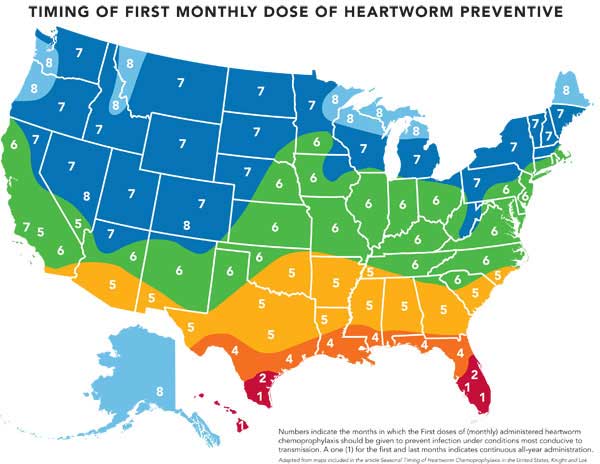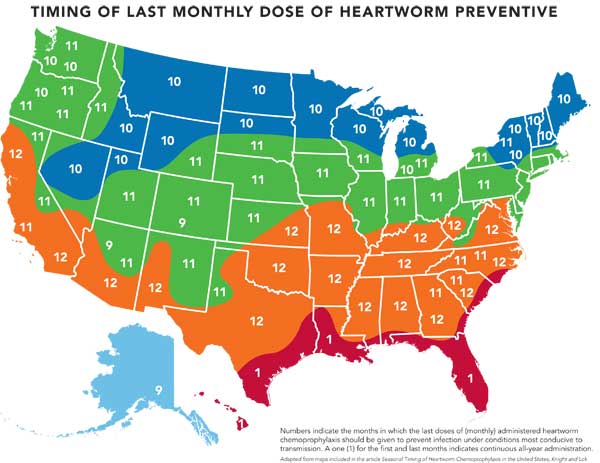
This is a placeholder text
Group text
by bubbabooboo on 31 May 2016 - 20:05
The maps indicate the months that your dog is at risk for heartworm disease. For example, in the first map northern Maine has an eight (8) which means that the first dose of heartworm prevention should be started on the first of the eighth month or August first. The second map has a ten (10) in northern Maine which means that you should continue prevention through the tenth month or October. Southern Florida has a one (1) in both maps which indicates that heartworm prevention should be used all year.
Maps are from this site http://healthypets.mercola.com/sites/healthypets/archive/2010/08/03/why-havent-pet-owners-been-told-these-facts-about-heartworm.aspx
Month to begin heartworm treatments 1=Jan .... 6=June ..... 12=December based on daily minimum and maximum temperatures. Extremely warm and wet or cold and dry conditions can alter the start and stop months.

Month to end heartworm treatment

For Raleigh NC the maps suggest begin in month 6 (June) and end in month 11 or 12 Novemeber or December. For lowland and coastal areas in southern most NC begin in May and end in January.
by joanro on 31 May 2016 - 20:05
by bubbabooboo on 31 May 2016 - 21:05
Just because mosquitoes are present does not mean they can support viable heartworm juveniles .. it is also temp dependent
- The right temperature. During the time the heartworm larvae are developing from L1 to L3 inside an infected mosquito, which is approximately a two-week period, the temperature must not dip below 57°F at any point in time. If it does, the maturation cycle is halted. According to Washington State University heartworm report from 2006, full development of the larvae requires "the equivalent of a steady 24-hour daily temperature in excess of 64°F (18°C) for approximately one month."
Just trying to give people the facts and not the BS from the American Heartworm Society ( started 1970-1974 at the same time avermectin insecticides for heartworm appeared ). I don't do this for the owners I do this for the dogs. Everyone must do what they think is best for their dog .. there was no time in Jan. - May in 2016 that night time temperatures did not dip into the 40's at least for a few days per month in Raleigh thus heartworm insecticide was not needed. In my location near Pittsboro NC the temps have only in the last week been close to warm enough for mosquitoes to find an infected host, feed and begin the 3 week or so incubation to allow transmission. In my location July 1 would still be safe due to "reach back" that kills the tiny microscopic heartworms but I will go ahead with treatment every 45 days for a total of 4 treatments and not the 12 recommended by veterinarians and the heartworm manufacturers through their front organization the American Heartworm Society. The fact is that insects ( both mosquitoes and heartworms ) are cold blooded and they can't fly, mate or develop during cold weather. Also the wing muscles in insects do not function when temperatures dip day or night and since mosquitoes are late day and night time feeders they are grounded in weather when temps dip so low that their wings fail to function. This immobility at cool temperatures is a well known phenomena in IPM ( integrated pest management ). A link from Dr. Becker discussing heartworm treatments and biology. Also there is the fact that mosquitoes infected may digest or fail to transmit heartworm and that healthy dogs can kill heartworm microscopic juveniles with immune responses.
by joanro on 31 May 2016 - 22:05
In the late 50s we had a dog that died from heartworms, he was only four years old. I sat on the floor with him while he choked to death on his own blood....I never want to see that again, its too easy to prevent nowadays.
by bubbabooboo on 31 May 2016 - 22:05
by bubbabooboo on 31 May 2016 - 22:05
Side Effects Ivermectin ( MECTIZAM ) in humans
Headache, dizziness, muscle pain, nausea, or diarrhea may occur. If you are being treated for "river blindness" (onchocerciasis), you may experience reactions to the dying parasites during the first 4 days of treatment, including joint pain, tender/swollen lymph nodes, eye swelling/redness/pain, weakness, vision changes, itching, rash, and fever. If any of these effects persist or worsen, tell your doctor or pharmacist promptly.
To reduce dizziness upon standing, get up slowly when rising from a sitting or lying position.
Remember that your doctor has prescribed this medication because he or she has judged that the benefit to you is greater than the risk of side effects. Many people using this medication do not have serious side effects.
Tell your doctor right away if any of these rare but very serious side effects occur: neck/back pain, swelling face/arms/hands/feet, chest pain, fast heartbeat, confusion, seizures, loss of consciousness.
A very serious allergic reaction to this drug is rare. However, seek immediate medical attention if you notice any symptoms of a serious allergic reaction, including: rash, itching/swelling (especially of the face/tongue/throat), severe dizziness, trouble breathing.
This is not a complete list of possible side effects. If you notice other effects not listed above, contact your doctor or pharmacist.
by joanro on 31 May 2016 - 22:05
by bubbabooboo on 31 May 2016 - 23:05
And you know they have had no side effects or long term health effects how?? Everyone but the dog has a choice. The corporations can rig the tests and omit the dangers ( ProHeart6 ) and the American Heartworm bought and paid for Society can tell us all that our dog "needs" 12 month a year heartworm control.
by Zenit2010 on 01 June 2016 - 00:06
"Interactions with other medication:
Cyclosporine is a substrate and an inhibitor of the MDR 1 P-glycoprotein transporter. Therefore, the co-administration of cyclosporine with P-glycoprotein substrates such as macrocyclic lactones (e.g. ivermectin and milbemycin) could decrease the efflux of such drugs from blood-brain barrier cells, potentially resulting in signs of CNS toxicity."
So it is possible that nearly two years of concurrent use of Sentinel with Atopica is resulting in signs of CNS toxicity leading to symptoms that I described in my other posts. My vet says he doesn't think so, but my gut feeling is that my dog is more likely to suffer from the two drugs together than to cut out the heartworm medication for a period of time, reduce the cyclosporine even further to keep his allergy symptoms in check, and see if his DM-like symptoms resolve. I live in Southern California and we are still in a drought and he lives indoors with me. I think I need to take my chances on the heartworm and see if his DM-like symptoms go away.
by joanro on 01 June 2016 - 00:06
No side effects from ivermectin...very serious side effects from heartworms. No brainer.
Contact information Disclaimer Privacy Statement Copyright Information Terms of Service Cookie policy ↑ Back to top




